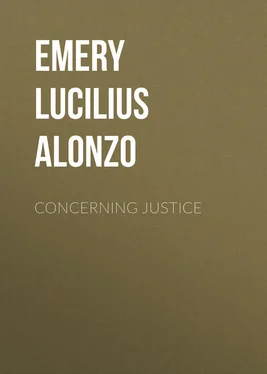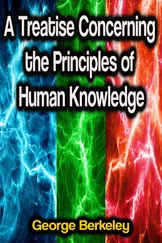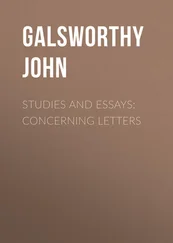Lucilius Emery - Concerning Justice
Здесь есть возможность читать онлайн «Lucilius Emery - Concerning Justice» — ознакомительный отрывок электронной книги совершенно бесплатно, а после прочтения отрывка купить полную версию. В некоторых случаях можно слушать аудио, скачать через торрент в формате fb2 и присутствует краткое содержание. Жанр: foreign_antique, foreign_prose, на английском языке. Описание произведения, (предисловие) а так же отзывы посетителей доступны на портале библиотеки ЛибКат.
- Название:Concerning Justice
- Автор:
- Жанр:
- Год:неизвестен
- ISBN:нет данных
- Рейтинг книги:3 / 5. Голосов: 1
-
Избранное:Добавить в избранное
- Отзывы:
-
Ваша оценка:
- 60
- 1
- 2
- 3
- 4
- 5
Concerning Justice: краткое содержание, описание и аннотация
Предлагаем к чтению аннотацию, описание, краткое содержание или предисловие (зависит от того, что написал сам автор книги «Concerning Justice»). Если вы не нашли необходимую информацию о книге — напишите в комментариях, мы постараемся отыскать её.
Concerning Justice — читать онлайн ознакомительный отрывок
Ниже представлен текст книги, разбитый по страницам. Система сохранения места последней прочитанной страницы, позволяет с удобством читать онлайн бесплатно книгу «Concerning Justice», без необходимости каждый раз заново искать на чём Вы остановились. Поставьте закладку, и сможете в любой момент перейти на страницу, на которой закончили чтение.
Интервал:
Закладка:
But though the notion that man has rights by nature, not granted by the state and which the state should respect as such, did not for centuries find expression in state papers or state action, it was by no means non-existent. It was early in the minds of many and found some expression in the writings of jurists and philosophers. In Rome it was a corollary of the doctrine of the existence of a jus naturale . The statement of that doctrine by Ulpian incorporated in the Digest implies a doctrine that man does have some rights anterior to and independent of the state. So far, however, as the statement was susceptible of that construction it was not generally acted upon and remained practically a dead letter. The doctrine itself survived, however, engaging the attention and receiving the support of various writers. It gradually gained ground among students of politics and spread rapidly after the Protestant Reformation, so-called, because of the impetus given by that event to the exercise of private judgment. As early as the 17th century, though finding little or no expression in the Petition of Right or Bill of Rights, the doctrine that individual rights were derived from nature rather than from the state was generally entertained by the Puritans and other dissenters from the Established Church, and was invoked by them to some extent as justifying the revolution of 1640. The doctrine also passed over to the Puritan Colonies in America and early found some expression there. In the Massachusetts "Body of Liberties" of 1641 there is a suggestion that the liberties, etc., therein recited, were those demanded by "humanity, civility and christianity" rather than "accustomed" liberties. It was further asserted that these liberties were to be enjoyed by the people of the Colony and their posterity forever.
The later disputes as to the proper limits of the power of the British King and Parliament over the American Colonies led the colonial lawyers and politicians to a study of the theory of natural rights advanced by various political writers, English and Continental. It has been said, I think with truth, that the writings of Locke, Voltaire, Rousseau, Montesquieu, and even of Blackstone, were more widely read and studied in America than in Europe. The brilliant writings of Tom Paine also had great influence. The result was that the doctrine of natural rights came to be generally accepted by the people of the Colonies as the real foundation of their claims and the real justification for their resistance to the objectionable acts of the King and Parliament. In 1774 the first Continental Congress in its Declaration of Rights declared that the people of the Colonies had those rights by "the immutable laws of nature" as well as by their charters and the principles of the English Constitution. Two years later in the Declaration of Independence the representatives of the people made no reference to their charters nor to the principles of the English Constitution as the foundation of their claims, but based them exclusively on the theory of natural rights. They declared: "We hold these truths to be self-evident, that all men are created equal; that they are endowed by their Creator with certain unalienable rights; that among these are life, liberty and the pursuit of happiness."
The same influences undoubtedly contributed to bring about the French Revolution of 1789, and the theory of natural rights again found expression in the French state papers of that period. In August of that year, in the early stages of the Revolution, the following "Declaration of the Rights of Man and Citizen" was put forth by the National Assembly and afterwards made the first two articles of the Constitution of 1791, viz., "Art. 1. Men are born and remain free and equal in rights. Social distinctions can be based only upon public utility. Art. 2. The aim of every political association is the preservation of the natural and imprescriptible rights of man. These rights are liberty, property, security and resistance to oppression."
Thus in the latter part of the 18th century the doctrine that man has some individual rights by nature, not by grant or prescription, and not alienable, obtained official recognition in two great nations. It has since been formally and officially iterated in the Constitutions of many American States and has been proclaimed and invoked as an impregnably established political truth. Nevertheless the doctrine is only a theory, not yet demonstrated nor undoubted. It has been assailed and in the opinion of many refuted, by Bentham, Mill, and other utilitarian writers, the successors of Epicurus, Carneades and the Sophists. Even in France and America it is now repudiated by many and declared to be an obstacle to social and political improvement. Still, despite the vigorous arguments against the doctrine, there remains the innate feeling and a general belief that society abridges individual rights instead of conferring them. In support of this notion may be cited the fact that the statutes of any state or nation are almost wholly restrictive or compulsory in character, and rarely, if ever, permissive. From the Decalogue down, the language of the law has been compulsive, "Thou shalt" and "Thou shalt not"; and men generally act upon the theory that what society does not forbid by statute or custom the individual may do.
In passing now from the region of theory, of speculative opinion, to what seems to me the region of facts, of actual conditions, of actual traits of human nature, I wish it to be understood distinctly that in what I may say about rights I am considering only the precepts of justice, and that I differentiate those precepts from the precepts of religion, charity, philanthropy, benevolence, and other similar virtues, and even those of what is loosely called humanity. If it be true as asserted by Addison that justice is the greatest and most godlike of the virtues, it does not follow that the just man, to be just, must possess all or any of the other virtues. One can be just without being religious, charitable, or philanthropic, and even without earning the reputation of being humane.
I wish further to premise that I am considering our subject only with reference to those who have grown to the age of self-maintenance and consequent freedom. I do not take into account the rights of children under that age.
With these premises borne in mind, I would now in the next chapter call attention to some propositions of fact, which I shall assume to be established by science and history and by the reader's own experience and observation, and which I think bear more or less directly on our subject.
CHAPTER III
THE PROBLEM OF RIGHTS CONTINUED. THE NEED OF LIBERTY OF ACTION FOR THE INDIVIDUAL
Men are endowed by nature with sundry powers, faculties, capacities, physical and mental. These, however, are not at all uniform, but are diverse in kind and degree in different races of men and in different individuals of the same race. Nature seems to work through diversity rather than through uniformity, indeed through inequality rather than through equality. Not all men are born poets, nor are all poets equally good poets. Not all men are by nature adapted for intellectual pursuits, and those who are so adapted are not in that respect equally favored by nature. Even in the field of the simplest manual labor there is great diversity of natural capacity. It seems to be nature's theory that mankind, the human race as a whole, will be better served by diversities, by differences in kinds and degrees of powers, than by uniformity and equality.
Конец ознакомительного фрагмента.
Текст предоставлен ООО «ЛитРес».
Прочитайте эту книгу целиком, купив полную легальную версию на ЛитРес.
Читать дальшеИнтервал:
Закладка:
Похожие книги на «Concerning Justice»
Представляем Вашему вниманию похожие книги на «Concerning Justice» списком для выбора. Мы отобрали схожую по названию и смыслу литературу в надежде предоставить читателям больше вариантов отыскать новые, интересные, ещё непрочитанные произведения.
Обсуждение, отзывы о книге «Concerning Justice» и просто собственные мнения читателей. Оставьте ваши комментарии, напишите, что Вы думаете о произведении, его смысле или главных героях. Укажите что конкретно понравилось, а что нет, и почему Вы так считаете.












